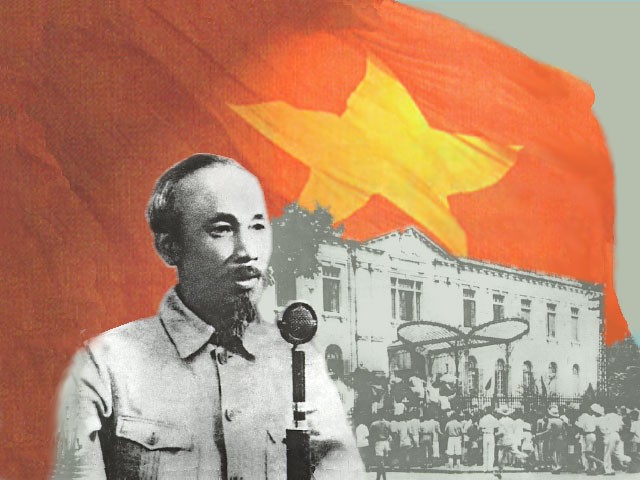(VOVworld) - The success of Vietnam’s August Revolution in 1945 gave birth to the Democratic Republic of Vietnam, the first worker-farmer State in Southeast Asia on September 2nd of the same year. The Vietnamese people’s aspiration for independence and freedom empowered the country to rise up and change its fate and also created considerable momentum for today’s national construction and development. VOV’s Thu Hoa reports.
 |
The Vietnamese Declaration of Independence was read by President Ho Chi Minh in Ba Dinh square on September 2, 1945 establishing the Democratic Republic of Vietnam and marking the success of the 1945 August Revolution which affirmed human rights and Vietnam’s aspirations for independence and freedom. Professor Van Tao, former director of the Vietnam History Institute said this aspiration prompted the Vietnamese people to rise up to seize power, and establish their independence: "The August Revolution is of the greatest historical significance. It was the only revolution that helped Vietnamese people escape from slavery to self-determination then changed Vietnamese society from a feudal and colonial regime to the current people’s democracy and socialism".
September 2, 1945, ushered in a new era of independence and freedom for the Vietnamese nation. The new government granted democratic benefits to the people such as removing the poll-tax, learning Vietnamese script free of charge, granting the right to vote, and discounting land tax 20%. In 1946, Vietnam held the first general election to set up a Government of the Democratic Republic of Vietnam which represented different social strata and worked on behalf of all Vietnamese people. The interim government soon won support from the people as it was for the people. Lawyer Luu Van Dat is a prominent itellectual: "The most important thing that I bore in mind was the spirit of national unity and talent appreciation of President Ho Chi Minh. The number of Party members was small then but a majority of the people supported President Ho Chi Minh and the Party. Most intellectuals followed the leadership of President Ho Chi Minh and were ready to contribute to the nation".
In the light of Marxism and Leninism and the people’s great aspiration for freedom and independence, President Ho Chi Minh continued developing the country after its foundation. Through ups and downs, the phrase “nation first, fatherland first” became a motto for unity and mass mobilization to support the revolution. The unity of the Vietnamese people drove Vietnam’s two resistance wars and the subsequent renovation process that lifted Vietnam from its outdated, underdeveloped status. Professor of History Le Mau Han says the spirit of the August Revolution and National Independence Day continues today: "The success of the August Revolution was the success of a law-governed state following Ho Chi Minh’s ideology and led by the Communist Party of Vietnam. It was the success of national spirit, equality, and national unity. It remains a valuable lesson for us today as we try to bring democracy and freedom into play during our renovation process".
67 years have passed since the August Revolution and Vietnam’s first National Independence Day, but lessons about building national unity, and a spirit of independence and self-determination remain, providing a guiding star for Vietnam’s development and integration.